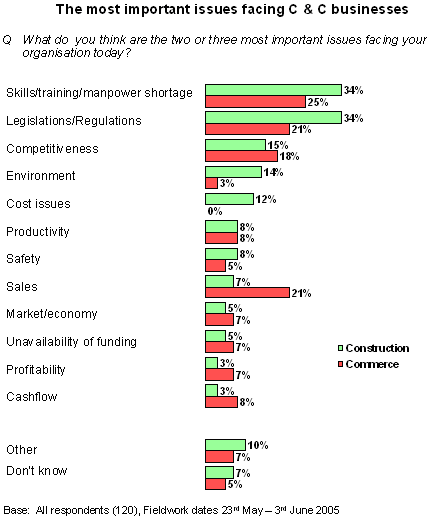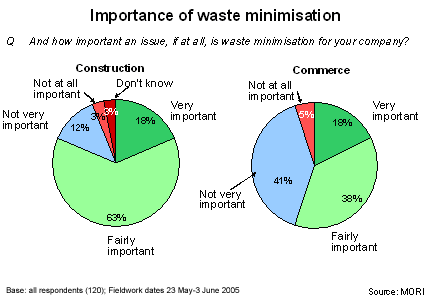SMEs And The Environment
MORI was commissioned by Envirowise to undertake a survey of SMEs in specific sectors (construction and various sectors of the services sector).
MORI has used the Department of Trade and Industry definition of SME (note 1). However, we have excluded micro businesses (1-9 employees) and as such interviewed businesses with between 10 and 249 employees. In line with this definition, throughout the report small, medium and larger medium companies are defined as:
- Small companies: 10-49 employees
- Medium companies: 50-100
- Larger medium sized companies: 101-249
Interviews were conducted between 23 May - 3 June 2005 by MORI Telephone Services (MTS). Telephone interviews were conducted with a sample of Small and Medium Enterprises across the United Kingdom. 120 interviews were undertaken with SMEs, all using Computer Aided Telephone Interviewing (CATI).
The sample was stratified to ensure a spread of interviews across the following industry sectors (numbers in brackets indicate the number of interviews that took place):
- Construction (59); and
- Commercial (61); comprising Advertising (6), Architecture (3), Accountancy (7), Charity/voluntary sector (7), Facilities Management (4), Finance (5), Insurance (3), IT/Telecoms (10), Law (5), Marketing/Marketing, Research/Public Relations (5), Publishing (5), Website development (1).
Fewer than one in ten (8%) SMEs say spontaneously that environmental issues are among the most important two or three issues facing them today. However that hides considerable variations.
Notes
- See www.dti.gov.uk/SME4/define.htm for further information.
Q1 To begin the interview, I would like to ask what you think are the two or three most important issues facing your organisation today?
| % | |
|---|---|
| Skills/ training/ manpower shortage | 29 |
| Legislation/ /Employment Laws | 28 |
| Competitiveness | 17 |
| Sales | 14 |
| Environmental issues | 8 |
| Productivity | 8 |
| Safety | 7 |
| Cashflow | 6 |
| Market/economy | 6 |
| Cost Issues | 6 |
| Unavailability of funding | 6 |
| Profitability | 5 |
| Business growth/expansion | 4 |
| Sustainability | 4 |
| Investment | 3 |
| Working time directive | 3 |
| Customer service | 3 |
| Meeting statutory requirements | 3 |
| Survival | 3 |
| Role / support of govt | 3 |
| Keeping up with new technology | 2 |
| Staff retention/turnover | 2 |
| Quality | 2 |
| Strength of the Pound | 1 |
| Security | 1 |
| Interest rates | 1 |
| Staff morale | 1 |
| Other | 8 |
| Don't Know / Nothing | 6 |
Construction businesses place somewhat more emphasis on the environment (14%), than commercial businesses (3%). Over the last year, between two and six per cent of the general public rated the environment as one of the most important issues.
Construction businesses give higher priority to skills, training or manpower shortages (34%), legislation/regulations (34%) and competitiveness (15%), while placing environmental matters above or a par with cost issues (12%), productivity (8%) or sales (7%).

However, when prompted on the specific issue of waste minimization, 68% of SMEs across the survey regarded it as an issue of some significance to their business, with even a slim majority among those working in commerce (56%) and a much greater one among respondents involved in construction (81%).
Q2 And how important an issue, if at all, is waste minimisation for your company? Is that very / fairly / not very / not at all?
| % | |
|---|---|
| Very important | 18 |
| Fairly important | 49 |
| Not very important | 27 |
| Not at all important | 4 |
| Don't know | 2 |




